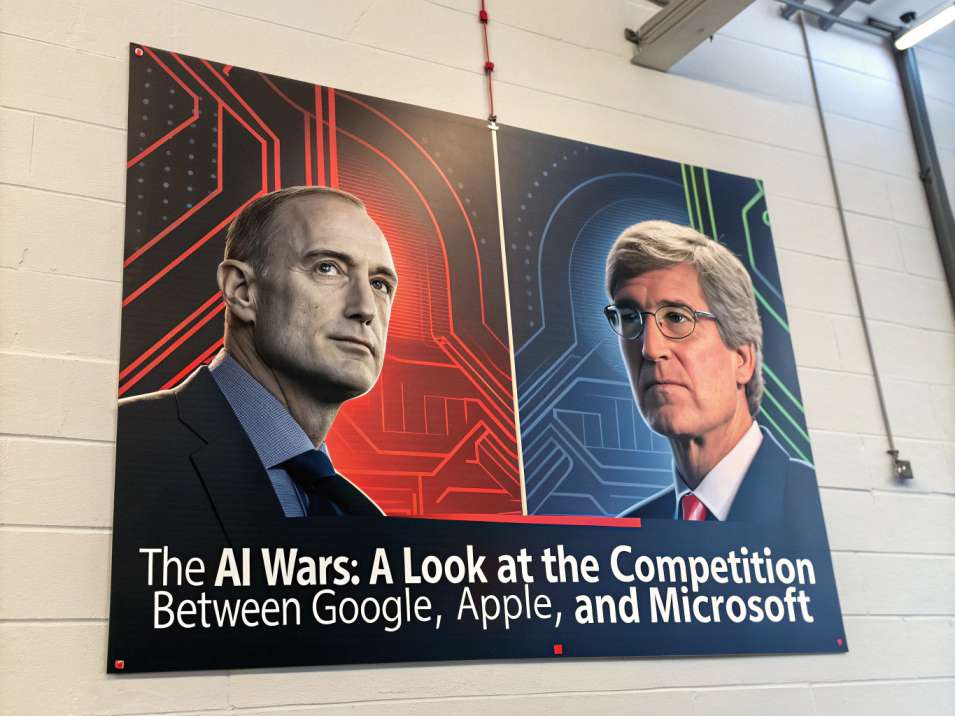The global technology landscape is undergoing a monumental shift, driven by the rapid evolution of Artificial Intelligence. While the competition for market dominance has always been fierce, the battle for AI supremacy has become the new tech arms race. At the heart of this conflict are the three giants: Google, Apple, and Microsoft, each with its own strategy, strengths, and vision for how AI will shape our future. This guide will take a look at the “AI Wars,” examining the unique approaches of each company as they vie for the top spot.
1. Google: The AI Pioneer
Google’s name is almost synonymous with AI. For years, the company has invested heavily in fundamental AI research, from deep learning and neural networks to large language models. Its long history in AI has given it a significant head start.
- Strategy: Google’s approach is to embed AI into its entire ecosystem, making it a foundational layer of every product. From its search engine and Google Photos to Google Maps and Android, AI is used to personalize experiences, improve efficiency, and provide smarter, more predictive services. The launch of its Gemini model and the integration of generative AI into its search engine signal its determination to remain the leader in AI.
- Key Strengths: Google has access to a massive amount of data, which is essential for training its AI models. Its research division, Google AI, is at the forefront of AI development, and its cloud infrastructure allows it to build and scale its models with incredible speed.
2. Apple: The Privacy-Focused Integrator
Apple has often been seen as a latecomer to the generative AI race, but that perception is quickly changing. The company’s strategy is not to lead with large, public-facing AI models but to integrate on-device AI in a way that is secure, personal, and respectful of privacy.
- Strategy: Apple’s core philosophy is to build AI that enhances its hardware and software while prioritizing user privacy. Its on-device AI processing for tasks like image recognition, predictive text, and speech-to-text ensures that user data never leaves the device, which is a key differentiator from its competitors. The recent announcement of Apple Intelligence and its integration into iOS and macOS showcases its commitment to a seamless, secure AI experience.
- Key Strengths: Apple’s powerful hardware, particularly the A-series and M-series chips, allows for on-device AI processing without relying on the cloud. Its loyal user base and a tightly controlled ecosystem give it the ability to push new AI features to millions of devices simultaneously.
3. Microsoft: The Business and Cloud Giant
Microsoft’s re-emergence as an AI leader is a story of strategic partnerships and a focus on enterprise. By investing billions in OpenAI, the company has positioned itself as the go-to provider of advanced AI technology for businesses.
- Strategy: Microsoft’s strategy is to bring AI to the workplace. It has integrated AI into its most popular products, including Microsoft 365, Copilot, and Azure. The goal is to make every business professional more productive with AI tools. Its partnership with OpenAI gives it exclusive access to powerful models like GPT-4, which it can offer to its enterprise clients through its cloud services.
- Key Strengths: Microsoft’s powerful Azure cloud computing platform provides the infrastructure needed to run large-scale AI models. Its deep connections to the enterprise market and a massive user base of businesses and professionals give it a unique advantage in the AI race.
Conclusion: The Future of AI
The competition between these three tech titans is not just about who has the most powerful AI model. It is a battle for the future of technology itself. Google is fighting to maintain its lead in research and consumer AI. Apple is focusing on building a more personal and private AI experience. And Microsoft is determined to be the leader in bringing AI to the business world. As they continue to innovate, the real winners will be the consumers and businesses that get to use these powerful new tools. The AI Wars are just getting started, and the outcomes will undoubtedly shape the next decade of technology.
